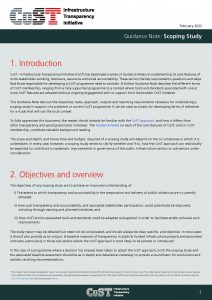 This latest addition to the suite of CoST Guidance Notes sets out the objectives, tasks, approach and reporting requirements necessary for undertaking a Scoping Study in support of a potential or actual CoST programme.
This latest addition to the suite of CoST Guidance Notes sets out the objectives, tasks, approach and reporting requirements necessary for undertaking a Scoping Study in support of a potential or actual CoST programme.
The scope and depth, and hence time and budget, required of a Scoping Study will depend on the circumstances under which it is undertaken. In every case, however, it serves to clarify whether, and if so how, the CoST approach can realistically be expected to contribute to systematic improvements in transparency, participation and accountability of the infrastructure sectors or sub-sectors under consideration. It provides a baseline for transparency in the infrastructure sector and sets out the current how the government, the private sector and civil society currently participate in the delivery of public infrastructure.
A recently published scoping study by CoST Sekondi-Takoradi recently highlighted gaps in transparency in Ghana and how this could be improved by completing the Ghana Electronic Procurement System (GHANEP).
The Guidance Note, together with associated Excel tools, serves as a basis for both for conducting a Scoping Study and for developing Terms of Reference that will suit the local context.
